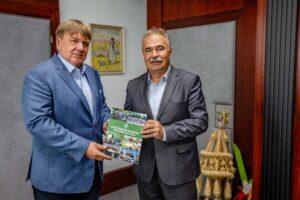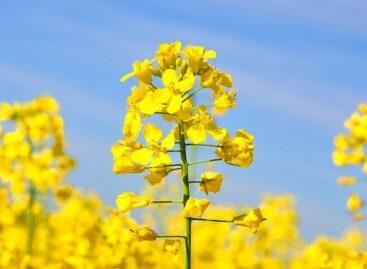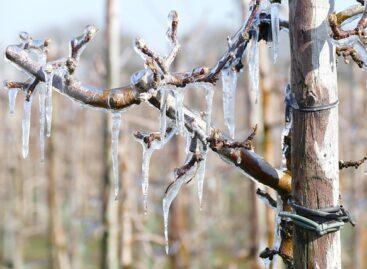The government will provide more than 20 billion forints of funding for the development of aquaculture until 2027
Domestic aquaculture plays a key role in supplying healthy and quality fish to fishing waters, therefore the government will provide more than 20 billion forints of funding for the sector until 2027 within the framework of the Hungarian Fisheries Operational Program Plus (MAHOP Plus), said István Nagy, Minister of Agriculture, at a press conference in Budapest on Monday.

(Photo: AM/Tibor Vermes)
At the presentation of the annual public service performance report of the Hungarian National Fishing Association (MOHOSZ), the Minister said: through the tenders, MOHOSZ can receive support at 100 percent intensity for carrying out tasks such as developing, creating and restoring the habitat and spawning grounds of native fish stocks, or suppressing alien fish species. According to his information, a total of 4,879 tons of fish were caught in the registered 160,000 hectares of fish farming water area and 26,000 hectares of fish ponds last year, of which the fishing catch amounted to 4,614 tons, which is a 2.8 percent increase compared to the previous year. Last year, the amount of stocking reached 4,071 tons, and the total value of the fish placed was 6.7 billion forints. He highlighted that thanks to the developments of recent years, the number of registered anglers exceeded one million last year, and Hungary was also at the forefront of international fishing tourism. In the National Fishing Tourism Strategy, adopted last year with the participation of MOHOSZ, 24 billion forints of resources are available for the development of sustainable fishing tourism until 2030, he explained. He called the 2019 agreement with the fishing association a milestone, through which MOHOSZ became a public service organization and thus took over 38 state tasks, which further strengthened its independence and socio-economic weight. In addition to its own revenues, MOHOSZ received 4.5 billion forints in budget support between 2014 and 2024, and the association’s revenue from state fishing permits exceeded 10.5 billion forints.
István Nagy also mentioned that Hungary continues to occupy a prominent place in the world’s freshwater fishing competition
Last year, national teams competed in 30 major international competitions, including 23 world and European championships, and Hungary was second in the world rankings last year in terms of the number of medals. The results so far show that Hungarian fishing sport can have an outstanding year in 2025 as well. The Minister identified the protection of natural waters and native fish stocks, the rehabilitation of spawning grounds, and the increase in the effectiveness of protection against invasive species as strategic goals. Furthermore, the creation of a water retention strategy to improve the country’s water resource management balance by developing sub-tasks related to fish management. In the strategy for the development and promotion of fishing tourism, special attention is paid to the preservation and development of fishing shorelines, as well as the establishment of piers and fishing ports, he noted.
Lajos Szűcs, president of the Hungarian National Fishing Association (MOHOSZ), said that since the 2015 transformation, the number of registered anglers has increased from 290 thousand to over one million in ten years
He added that with the development of the digital platform and the launch of the mobile application, anglers no longer need to have paper-based fishing documents, and this has created an instantly updated database. He called one of the successes of last year the birth of the fishing tourism strategy, which enables networked developments. Lajos Szűcs also said that this year’s turnover data also shows that the management of MOHOSZ is based on stable foundations, and announced that the prices of fishing tickets will not change next year. István Dérer, Director General of the National Fishing Organization Center, said that recreational fishing generates a turnover of about 30 billion forints, and fish farming generates over 120 billion forints, providing jobs for thousands of people and leisure activities for hundreds of thousands of people. Speaking about the challenges, he said that climate change also affects aquaculture. They are asking for the help of the drought protection operational team and supporting them so that the approximately 1,500 fish farming water areas can survive the next, expectedly difficult weather period. The annual stocking and catch data of the MOHOSZ shows that in all large natural water areas, the population of catfish, which is well adapted to warmer climatic conditions, is dynamically increasing, while perch and pike, which prefer colder sections, are at the other end of the line, he explained. The low water level is not conducive to natural spawning conditions, which is why the role of autumn and spring fish stocking applications is becoming more important, for which more money is being spent this year than ever before, he added. He noted that MOHOSZ has been the official fish management operator of Lake Tisza since 2025 and the turnover of annual area tickets has increased by a fifth this year. István Dérer also said that MOHOSZ plans to use MAHOP Plusz development funds to establish a unified water quality monitoring system in state-owned natural waters, develop habitats, and launch equipment procurement.
AM/MTI
Related news
AM: Ministry of Agriculture pays special attention to supporting the horticultural sector
🎧 Hallgasd a cikket: Lejátszás Szünet Folytatás Leállítás Nyelv: Auto…
Read more >Related news
The Hungarian Food Book is 50 years old
🎧 Hallgasd a cikket: Lejátszás Szünet Folytatás Leállítás Nyelv: Auto…
Read more >NKFH: inspections focus on discount prices and customer deception
🎧 Hallgasd a cikket: Lejátszás Szünet Folytatás Leállítás Nyelv: Auto…
Read more >







